Mustafa Chasmai
Audio Geolocation: A Natural Sounds Benchmark
May 24, 2025Abstract:Can we determine someone's geographic location purely from the sounds they hear? Are acoustic signals enough to localize within a country, state, or even city? We tackle the challenge of global-scale audio geolocation, formalize the problem, and conduct an in-depth analysis with wildlife audio from the iNatSounds dataset. Adopting a vision-inspired approach, we convert audio recordings to spectrograms and benchmark existing image geolocation techniques. We hypothesize that species vocalizations offer strong geolocation cues due to their defined geographic ranges and propose an approach that integrates species range prediction with retrieval-based geolocation. We further evaluate whether geolocation improves when analyzing species-rich recordings or when aggregating across spatiotemporal neighborhoods. Finally, we introduce case studies from movies to explore multimodal geolocation using both audio and visual content. Our work highlights the advantages of integrating audio and visual cues, and sets the stage for future research in audio geolocation.
A Language-Guided Benchmark for Weakly Supervised Open Vocabulary Semantic Segmentation
Feb 27, 2023Abstract:Increasing attention is being diverted to data-efficient problem settings like Open Vocabulary Semantic Segmentation (OVSS) which deals with segmenting an arbitrary object that may or may not be seen during training. The closest standard problems related to OVSS are Zero-Shot and Few-Shot Segmentation (ZSS, FSS) and their Cross-dataset variants where zero to few annotations are needed to segment novel classes. The existing FSS and ZSS methods utilize fully supervised pixel-labelled seen classes to segment unseen classes. Pixel-level labels are hard to obtain, and using weak supervision in the form of inexpensive image-level labels is often more practical. To this end, we propose a novel unified weakly supervised OVSS pipeline that can perform ZSS, FSS and Cross-dataset segmentation on novel classes without using pixel-level labels for either the base (seen) or the novel (unseen) classes in an inductive setting. We propose Weakly-Supervised Language-Guided Segmentation Network (WLSegNet), a novel language-guided segmentation pipeline that i) learns generalizable context vectors with batch aggregates (mean) to map class prompts to image features using frozen CLIP (a vision-language model) and ii) decouples weak ZSS/FSS into weak semantic segmentation and Zero-Shot segmentation. The learned context vectors avoid overfitting on seen classes during training and transfer better to novel classes during testing. WLSegNet avoids fine-tuning and the use of external datasets during training. The proposed pipeline beats existing methods for weak generalized Zero-Shot and weak Few-Shot semantic segmentation by 39 and 3 mIOU points respectively on PASCAL VOC and weak Few-Shot semantic segmentation by 5 mIOU points on MS COCO. On a harder setting of 2-way 1-shot weak FSS, WLSegNet beats the baselines by 13 and 22 mIOU points on PASCAL VOC and MS COCO, respectively.
From Forks to Forceps: A New Framework for Instance Segmentation of Surgical Instruments
Nov 26, 2022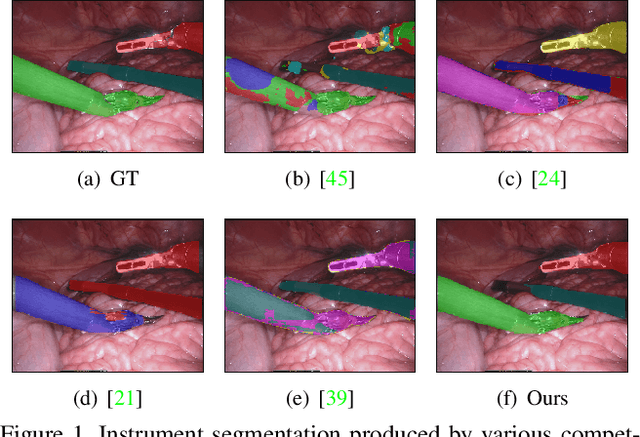
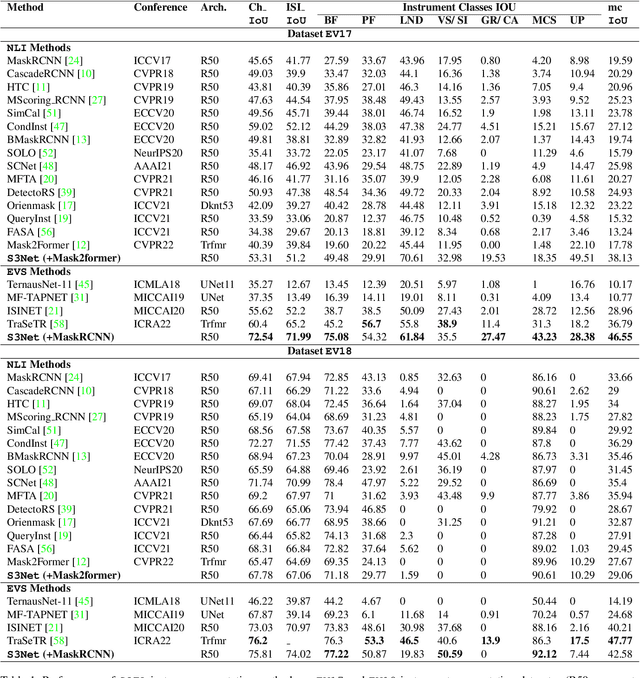
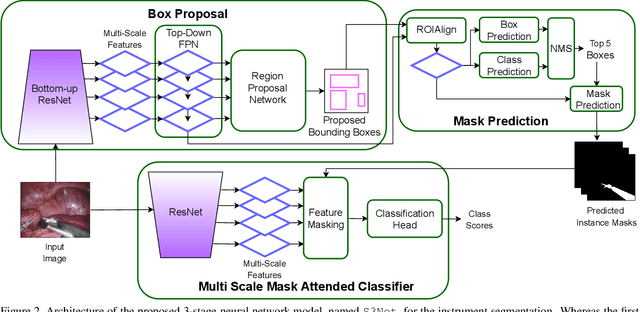
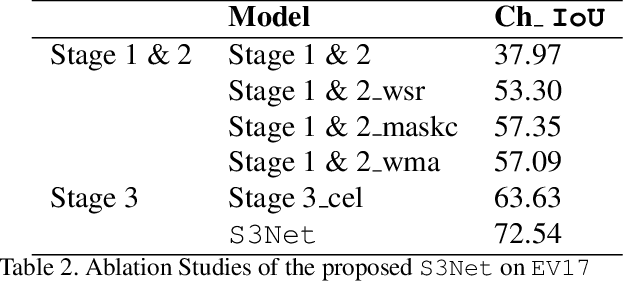
Abstract:Minimally invasive surgeries and related applications demand surgical tool classification and segmentation at the instance level. Surgical tools are similar in appearance and are long, thin, and handled at an angle. The fine-tuning of state-of-the-art (SOTA) instance segmentation models trained on natural images for instrument segmentation has difficulty discriminating instrument classes. Our research demonstrates that while the bounding box and segmentation mask are often accurate, the classification head mis-classifies the class label of the surgical instrument. We present a new neural network framework that adds a classification module as a new stage to existing instance segmentation models. This module specializes in improving the classification of instrument masks generated by the existing model. The module comprises multi-scale mask attention, which attends to the instrument region and masks the distracting background features. We propose training our classifier module using metric learning with arc loss to handle low inter-class variance of surgical instruments. We conduct exhaustive experiments on the benchmark datasets EndoVis2017 and EndoVis2018. We demonstrate that our method outperforms all (more than 18) SOTA methods compared with, and improves the SOTA performance by at least 12 points (20%) on the EndoVis2017 benchmark challenge and generalizes effectively across the datasets.
Adversarially Robust Prototypical Few-shot Segmentation with Neural-ODEs
Oct 07, 2022Abstract:Few-shot Learning (FSL) methods are being adopted in settings where data is not abundantly available. This is especially seen in medical domains where the annotations are expensive to obtain. Deep Neural Networks have been shown to be vulnerable to adversarial attacks. This is even more severe in the case of FSL due to the lack of a large number of training examples. In this paper, we provide a framework to make few-shot segmentation models adversarially robust in the medical domain where such attacks can severely impact the decisions made by clinicians who use them. We propose a novel robust few-shot segmentation framework, Prototypical Neural Ordinary Differential Equation (PNODE), that provides defense against gradient-based adversarial attacks. We show that our framework is more robust compared to traditional adversarial defense mechanisms such as adversarial training. Adversarial training involves increased training time and shows robustness to limited types of attacks depending on the type of adversarial examples seen during training. Our proposed framework generalises well to common adversarial attacks like FGSM, PGD and SMIA while having the model parameters comparable to the existing few-shot segmentation models. We show the effectiveness of our proposed approach on three publicly available multi-organ segmentation datasets in both in-domain and cross-domain settings by attacking the support and query sets without the need for ad-hoc adversarial training.
Robust Prototypical Few-Shot Organ Segmentation with Regularized Neural-ODEs
Aug 26, 2022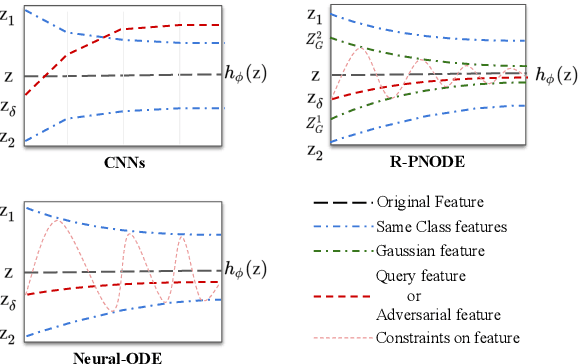
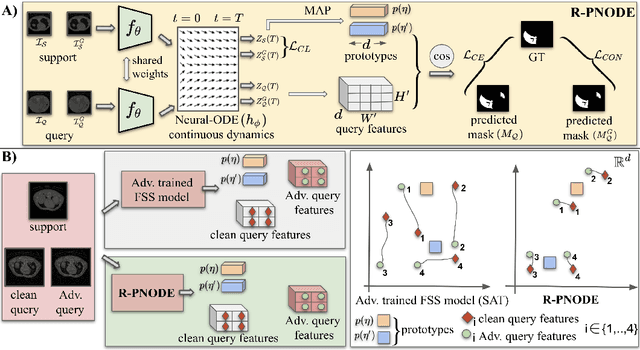


Abstract:Despite the tremendous progress made by deep learning models in image semantic segmentation, they typically require large annotated examples, and increasing attention is being diverted to problem settings like Few-Shot Learning (FSL) where only a small amount of annotation is needed for generalisation to novel classes. This is especially seen in medical domains where dense pixel-level annotations are expensive to obtain. In this paper, we propose Regularized Prototypical Neural Ordinary Differential Equation (R-PNODE), a method that leverages intrinsic properties of Neural-ODEs, assisted and enhanced by additional cluster and consistency losses to perform Few-Shot Segmentation (FSS) of organs. R-PNODE constrains support and query features from the same classes to lie closer in the representation space thereby improving the performance over the existing Convolutional Neural Network (CNN) based FSS methods. We further demonstrate that while many existing Deep CNN based methods tend to be extremely vulnerable to adversarial attacks, R-PNODE exhibits increased adversarial robustness for a wide array of these attacks. We experiment with three publicly available multi-organ segmentation datasets in both in-domain and cross-domain FSS settings to demonstrate the efficacy of our method. In addition, we perform experiments with seven commonly used adversarial attacks in various settings to demonstrate R-PNODE's robustness. R-PNODE outperforms the baselines for FSS by significant margins and also shows superior performance for a wide array of attacks varying in intensity and design.
A View Independent Classification Framework for Yoga Postures
Jun 27, 2022

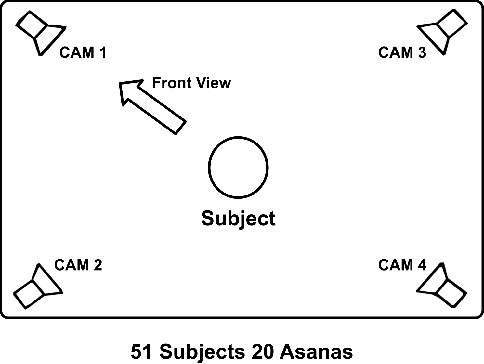
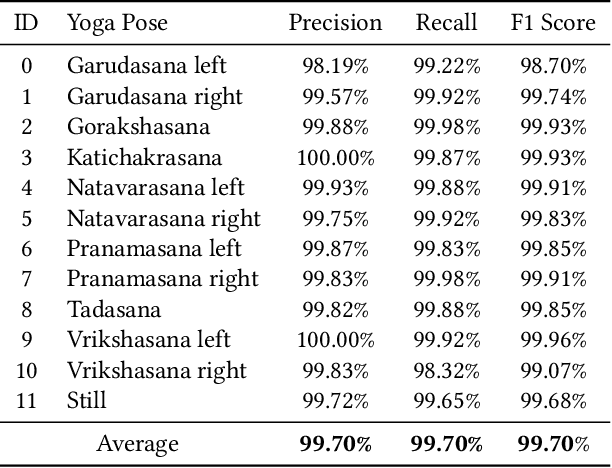
Abstract:Yoga is a globally acclaimed and widely recommended practice for a healthy living. Maintaining correct posture while performing a Yogasana is of utmost importance. In this work, we employ transfer learning from Human Pose Estimation models for extracting 136 key-points spread all over the body to train a Random Forest classifier which is used for estimation of the Yogasanas. The results are evaluated on an in-house collected extensive yoga video database of 51 subjects recorded from 4 different camera angles. We propose a 3 step scheme for evaluating the generalizability of a Yoga classifier by testing it on 1) unseen frames, 2) unseen subjects, and 3) unseen camera angles. We argue that for most of the applications, validation accuracies on unseen subjects and unseen camera angles would be most important. We empirically analyze over three public datasets, the advantage of transfer learning and the possibilities of target leakage. We further demonstrate that the classification accuracies critically depend on the cross validation method employed and can often be misleading. To promote further research, we have made key-points dataset and code publicly available.
PyKale: Knowledge-Aware Machine Learning from Multiple Sources in Python
Jun 17, 2021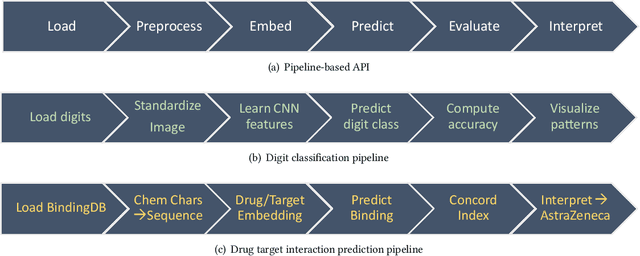

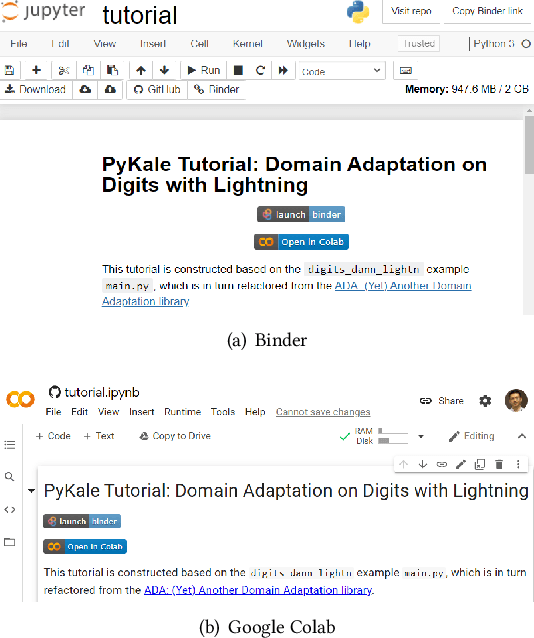
Abstract:Machine learning is a general-purpose technology holding promises for many interdisciplinary research problems. However, significant barriers exist in crossing disciplinary boundaries when most machine learning tools are developed in different areas separately. We present Pykale - a Python library for knowledge-aware machine learning on graphs, images, texts, and videos to enable and accelerate interdisciplinary research. We formulate new green machine learning guidelines based on standard software engineering practices and propose a novel pipeline-based application programming interface (API). PyKale focuses on leveraging knowledge from multiple sources for accurate and interpretable prediction, thus supporting multimodal learning and transfer learning (particularly domain adaptation) with latest deep learning and dimensionality reduction models. We build PyKale on PyTorch and leverage the rich PyTorch ecosystem. Our pipeline-based API design enforces standardization and minimalism, embracing green machine learning concepts via reducing repetitions and redundancy, reusing existing resources, and recycling learning models across areas. We demonstrate its interdisciplinary nature via examples in bioinformatics, knowledge graph, image/video recognition, and medical imaging.
 Add to Chrome
Add to Chrome Add to Firefox
Add to Firefox Add to Edge
Add to Edge